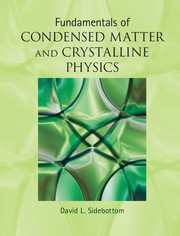 Fundamentals of Condensed Matter and Crystalline Physics
Fundamentals of Condensed Matter and Crystalline Physics from Part III - Dynamics
Published online by Cambridge University Press: 05 August 2012
Introduction
Up to now, we have considered only those inherent microscopic dynamics in a material that are present at equilibrium and are driven by the thermal energy content of the material itself. Here, in our last chapter dealing with dynamics, we consider instead the macroscopic, bulk dynamics of materials in non-equilibrium situations where an external force is applied or removed. Examples include the stretching or bending of a solid that results from application of a mechanical force, or the polarization of a dielectric material resulting when an external electric field is applied.
Several common features emerge in the response of a material to an external force or field. In all cases, there is some aspect of elasticity by which application of the force results in the storage of potential energy, that is returned when the force is removed. In all cases, this storage of energy is accompanied by some element of viscous drag or damping by which a portion of the work done during the deformation is lost in the form of heat. Like friction, this damping is a microscopic feature inherent in the thermodynamic fluctuations, and the energy lost during the deformation is returned to the same thermal bath from which it was derived. In fact, we will show that an important theorem exists, known as the fluctuation–dissipation theorem, which relates the macroscopic dissipation of energy in these bulk, non-equilibrium, processes directly to the inherent microscopic fluctuations present at equilibrium.
To save this book to your Kindle, first ensure [email protected] is added to your Approved Personal Document E-mail List under your Personal Document Settings on the Manage Your Content and Devices page of your Amazon account. Then enter the ‘name’ part of your Kindle email address below. Find out more about saving to your Kindle.
Note you can select to save to either the @free.kindle.com or @kindle.com variations. ‘@free.kindle.com’ emails are free but can only be saved to your device when it is connected to wi-fi. ‘@kindle.com’ emails can be delivered even when you are not connected to wi-fi, but note that service fees apply.
Find out more about the Kindle Personal Document Service.
To save content items to your account, please confirm that you agree to abide by our usage policies. If this is the first time you use this feature, you will be asked to authorise Cambridge Core to connect with your account. Find out more about saving content to Dropbox.
To save content items to your account, please confirm that you agree to abide by our usage policies. If this is the first time you use this feature, you will be asked to authorise Cambridge Core to connect with your account. Find out more about saving content to Google Drive.